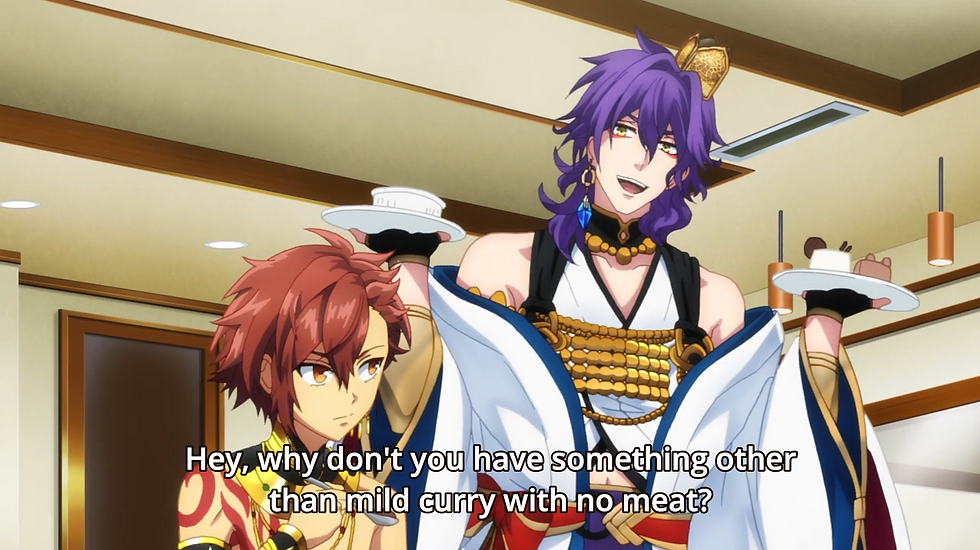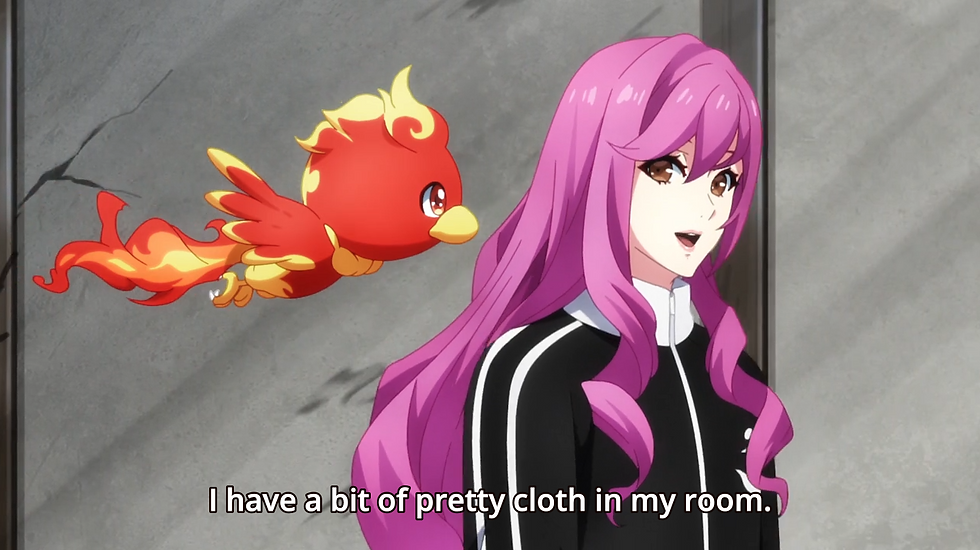Anime Review: Namu Amida Butsu! Rendai Utena
- Joseph Lutholtz
- Jul 31, 2019
- 6 min read

Score: 5/10, 3/5
Length: 12 Episodes
Genre: Action, Comedy, Pseudohistory, Supernatural
Review: For centuries, a war has been waged between the embodiments of humanity's virtues and their darker vices. Legends have been told of this conflict yet most believe them to be just that-- legends--tales of long ago that bear no relevance on modern society. Yet virtue and vice remain integral to human existence. So, to keep a watchful eye on the machinations of the source of vice, Mara, and better protect humanity from his influence, many divine beings and the 13 Buddhas have made their home on Earth once more. Led by Mara's natural enemy, the enlightened Shaka Nyorai (known also as Siddhartha), these divine beings do battle with the forces of vice as they also contend with the vices present within their mortal bodies.
Review: Edutainment, as a concept, is probably one of the most tricky hooks an anime can implement to grab its viewers. For starters, it's a hook that depends on the thought that the viewer doesn't already know the basics of its subject matter. Inherently flawed as this approach is, though, there have been a good number of shows this year that have managed to successfully edutain me. The first that comes to mind is Cells at Work! which managed to offer basic microbiology lessons in the form of a cutesy slice of life comedy. Most sports anime also fall into this category for me as well since I know very little about sports. Hinomaru Sumo, on top of being an all-around good shounen title, benefited from being edutainment for me since I knew nothing about the action and appeal of sumo wrestling. That kind of extra educational factor can always give a show a leg up on its competition, even if it's just because it appears to be more passionate about its subject because of it. Despite being a train wreck in nearly every way, Kotobuki Hikoutai still managed to successfully showcase its love of WWII-era planes and educate me on some specific models of plane in the process. Yet, I think the shows that succeed the most at educationally entertaining me are those that dive headlong into a topic I know nothing about, give me a story to sink my teeth into, and gradually explain things as that story develops. Touken Ranbu, despite being an adaptation of a gatcha game, is a perfect example of this. The way it managed to blend a larger narrative with the stories of a few dozen historically significant weapons was nothing short of genius. Here's the problem with this spike in edutainment though: lots of other properties are seeing what these shows are doing and want to imitate their successes but are wholly missing the point.

Yep, this is going to be yet another disappointed review. Apologies in advance, everyone.
Namu Amida Butsu!, another gatcha adaptation, is a good example of this very problem. While it sets itself up as a perfect means to teach its viewers about the various figures in Hindu-Buddhist mythology, the show ends up being little more than a character comedy with no real value beyond name-dropping myths and figures I still know little about. As far as I can tell, there is very little connection between the deities and Buddhas named in the show and their historical/mythological counterparts. Instead, all we get are eighteen characters whose personalities can be boiled down to a single joke played on repeats, many of whom don't even play a role in the show's overall story. Let's consider the show's two main, perspective characters for starters, Taishakuten (the deity Śakra) and Bonten (Brahmā). At the start of the series, these two Buddhist deities are summoned to join the 13 Buddhas on Earth in their battle to protect humanity from vice and, by association, the personification of all earthly vices, the demon Mara. To make sure that there is some drama to get the show starting, though, it is made abundantly clear that Taishakuten and Bonten just don't get along. Vague explanations regarding Taishakuten's connection to the wrathful Asura early on but these details are quickly boiled down to differences in their personalities as the show goes on. Taishakuten, for his part, is played as a stoic but dedicated warrior with very few social skills. Bonten, then, is played as the busybody diva who simply can't go five minutes without criticizing everyone around him. As you might expect, though, the series spends all its time trying to make these two get over their petty feuding and just work together like they should have from the start.

Now, just keep in mind that these two are the closest thing this show offers to "real" characters.
To give credit where it's due, though, I will admit that the show does a fairly good job turning the overall story into a means for these two to get over their differences. Namely, as these two are repeatedly forced to work together, they end up talking through their feelings and dedication to a shared goal. As they battle Mara's influence on humanity, confront the rogue Ashura, and acknowledge their flaws--that Taishakuten has a bad habit of getting mad from time to time and that Bonten is a tad too prideful--they end up becoming believable allies. Unfortunately, this is more or less all that they offer. It takes the entirety of the series and a lot of dramatic action sequences for these two to go from being reluctant allies to compatriots. What's baffling about this sluggish and ultimately pointless development, though, is that they aren't the only ones that go down this same path. Two of the other figures in their shared temple home undergo this exact same arc: the pompous and superficial Dainichi Nyorai (Vairocana) and the quick to anger Fudōmyō Ō (Acalanātha). Like Taishakuten and Bonten, these two spend most of the series fighting each other and hurling insults back and forth as a means to voice their frustration at a shared past that is never actually discussed. By series' end, however, they end up getting over their past, solving the show's final crisis, and become the best of friends once more, forcing me to question if there was a point to their feud beyond a simple need for more character drama.

See, that dig is obviously supposed to mean something but I just don't have the context to understand it.
Throughout the series, there are plenty of throwaway lines that are clearly meant to reference the series various characters and their pasts but nothing is ever actually expounded upon. Instead, these little references are turned into little more than gags that fuel the series' underwhelming character comedy. For example, as one of the few bits of lore that's explained, the series turns the belief that Dainichi is the embodiment of the sun into an easy pun about him being self-centered and flashy. Similarly, the understanding that Bonten is Buddism's king of the heavens (a fact I had to look up) is turned into justification for him being an arrogant snob. Unlike the rest of the series characters, though, these four divinities are more than the sum of their punny attitudes. The remaining fourteen characters are little more than cutout tropes and gags that serve no actual purpose. Amida Nyorai (Amitābha), for example, only exists to be a constant source of terrible puns, the Japanese equivalent of dad jokes. The mythical creature Karuraten (Karura / Garuda) only exists to be the gag mascot character of the series. Worst of all, Ashuku Nyorai (Akṣobhya), thanks to their feminine design, isn't so much a character as they are a walking "trap" joke.

Man, isn't it great when a character's only gag is that they crossdress or are potentially transgender. That was rhetorical. It isn't great at all.
So, in the end, I'm ultimately left with nothing to talk about and nothing to praise this show for. The action is mildly noteworthy and the final conflict between Shaka Nyorai (Gautama Buddha / Siddhartha) and Mara has some nuance to it but ultimately ends on a note that Mara was destined to fail from the very beginning, making the whole journey feel pointless in the process. Had this series even remotely bothered to explain who its characters were, why they act the way they do, or what their relevance to Hindu-Buddhist mythology is, I might have been able to follow along and care about the overarching story. Since it doesn't bother to do any of those things, though, I simply couldn't be bothered to care. For the sake of clarity, I had to research the traditional names of these figures myself just to learn enough to cover this review and that's enough to prove that this show failed as a form of edutainment. I learned nothing from this mess and had to take it upon myself just to learn the characters' names, aspects, and any relevant information that might have influenced how they appeared in the story. As I said before, though, there is hardly any connection between these characters and their historical/mythological equivalents. Only a handful even come close to representing their namesake and that's frankly the most disappointing thing of all--that the show couldn't even be bothered to give its entire cast even that level of minimum effort. That being the case, I don't see why anyone should put forward the effort just to slog through this waste of a show. Instead, I'd wholly recommend giving Touken Ranbu or even Kancolle a chance. These shows, at least, managed to make me care about their story and personified objects.


Comments